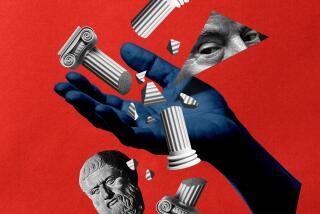Government and Virtue
- Share via
The first responsibility of government is order and safety. But that is not the whole picture. Government also aims to help those who are trying to be good and raise their children to be so. Aristotle says that governments are formed for the sake of living, for self-preservation. But they continue to exist for the sake of living well. Partly, that means material prosperity. For Aristotle, and for America’s founders, it also meant living virtuously--cultivating family, friendship, art, philosophy.
But governments often fail to help people who are trying to be good. Governments have a tendency to become degraded and corrupt. This is not a problem for modern liberals because they have a peculiar understanding of these terms. They think that working at a minimum-wage job is degrading but welfare is not, that private business turning a profit is corrupt but redistribution of income is not. For them, the private sector is the problem, government is the solution.
Most conservatives believe the opposite. Many attempt to deal with the problem of degraded and corrupt government by assuming that government should stay away from “moral judgments.” This is the libertarian temptation. In our time, it is a powerful and attractive argument. I believe it is mistaken.
Consider the different kinds of moral obligations we have. Most Americans are still religious and believe in moral obligations to God. Government steers clear of these; it does not favor one religion over another. Its function is simply to protect our right to worship so long as we do not harm others or threaten public order.
Then there are the moral obligations we have to one another. Everyone agrees that government must enforce laws against murder, theft and fraud. If the law is not based on what is moral and right, all we have are pages of tax breaks and other special-interest favors.
Aside from our duties to God and to one another, there is a third area of morality. This has to do with “cleaning up the things inside each man,” in the words of C.S. Lewis. He uses the metaphor of a fleet of ships. Some rules define the right of way and keep the ships from colliding; others determine the ships’ destination. But there is also the question of whether a ship is seaworthy, internally sound. This area is the duty we have to develop our personal virtue.
Traditionally, the elements of this personal morality have been described as the “cardinal virtues”: justice, temperance, fortitude and prudence. The cultivation of these habits begins in the home. The family depends on and reflects the virtues. It is just to honor our spouse and care for our children. Prudence helps us provide for them. Moderation and fortitude help us stick together through difficult times. Society supports the virtues through schools, churches and, to some extent, manners.
What is the role of the government here? In passing and enforcing laws, it has no direct role. But it does support private virtue through laws preserving the family and the private sector. The founders did not believe government should, or could, avoid moral distinctions. Nor did they think morality could be imposed directly by law. Rather, they knew that virtue is best encouraged by protecting morality’s natural incubator: families and churches. This is one reason they wanted limited government--to keep the private sector strong.
Today, oversized government smothers us with oppressive compassion. It undermines the private sector and weakens virtue. The welfare state replaces the role of family members, neighbors and parishioners. Government tries to take care of all our needs and thus undermines personal responsibility. Because it tries to do too much, government fails in a more basic duty: pursuing and punishing criminals. This threatens our attachment to justice. Military discipline and honor are disdained. This weakens the habits of courage.
Modern liberals want big government and weak, dependent citizens. Libertarians want limited government, but don’t realize that limited government must make moral distinctions and encourage strong families and virtuous citizens.
Consider George Washington’s inaugural speech of 1789:
“There is no truth more thoroughly established, than that there exists in the economy and course of nature, an indissoluble union between virtue and happiness . . . The propitious smiles of Heaven can never be expected on a nation that disregards the external rules of order and right . . . since the preservation of the sacred fire of liberty, and the destiny of the republican model of government, are . . . staked on the experiment entrusted to the hands of the American People.”
When Americans cease to be virtuous, that sacred fire of liberty will be extinguished.


